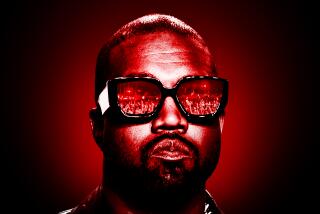Anger Over Madonna Single : Pop music: The Simon Wiesenthal Center is targeting the singer’s use of an allegedly anti-Semitic biblical passage in a new version of her top-selling ‘Justify My Love’ single.
- Share via
It’s not surprising that Madonna is in the middle of another controversy. But who would have ever thought she’d get into trouble for reading the Bible?
A new version of the pop music vamp’s top-selling single “Justify My Love”--called “The Beast Within Mix”--is being targeted by the Simon Wiesenthal Center for containing an allegedly anti-Semitic New Testament passage. On Wednesday, Rabbi Abraham Cooper, the center’s associate dean, fired off a letter to Madonna’s manager requesting that the “offensive” excerpt be removed from the song.
The largely Jewish human-rights organization, which is based in Los Angeles, objects to a three-line passage on the six-minute remix culled from the Book of Revelation which says: “And the slander of those who say they are Jews, but they are not, they are a synagogue of Satan.”
Madonna, baptized a Catholic, has frequently been criticized by Christian groups for mixing sacred and sexual imagery in her songs and videos. The video version of “Justify My Love” was banned by MTV because the cable television station deemed it too sexually explicit to broadcast. The video is also being targeted for removal from video stores in Florida by media watchdogs.
The version of “Justify My Love” being challenged by the Simon Wiesenthal Center appears as one of five remixes of the tune currently available on her Warner Bros. CD single. In the sitar-punctuated “Beast Within Mix,” which has not been played widely on radio stations, Madonna quotes several chapters from an apocalyptic vision of Judgment Day as presented in the Book of Revelation to the Apostle John.
“This text is incredibly insensitive and potentially dangerous,” Cooper said. “Anti-Semitism is a real problem in America today and an entertainer as big of a blockbuster as Madonna should show some responsibility to such social issues.”
Madonna, according to her publicist, was shocked by the accusation.
“People can say I am an exhibitionist, but no one can ever accuse me of being a racist,” Madonna said Thursday in a statement from New York. “I am not even going to try to defend myself against such ridiculous accusations.”
“We acknowledge from the outset that this passage comes right from the New Testament--but that in itself is no excuse,” Cooper said. “Quoting bigoted remarks from the Bible only serves to fuel the doctrine of anti-Semitism preached by a growing number of white supremacists, including the Christian identity movement.”
Two years ago, the Simon Wiesenthal Center made headlines after it ran an advertisement in several trade magazines criticizing the rock group Guns N’ Roses and former Public Enemy rap member Professor Griff for allegedly promoting anti-Semitic sentiments.
“This is much worse than the anti-Semitism found in Public Enemy’s ‘Welcome to the Terrordome’ or Guns N’ Roses ‘One in a Million,’ ” Cooper said. “It’s much worse in the sense of imagery. It portrays the Jew as a devil, linking Judaism to devil worship and demonology in the synagogue.”
But Florida anti-pornography crusader Jack Thompson--a born-again Christian activist currently engaged in a campaign to halt the sale of Madonna’s racy “Justify My Love” music video single--offers a different take on Madonna’s biblical reading.
“All Madonna’s doing here is reading Scripture written by Jews about a Jewish messiah,” Thompson said Thursday. “Rabbi Cooper’s problem seems not to be with Madonna but with the Jewish Jesus, and the way I see it, he better figure out who Jesus is before what John is writing about happens. My problem with Madonna isn’t what she relates from the Bible, it’s what she relates from Hustler magazine to the small children who worship her.”
Madonna has a history of upsetting religious leaders.
The Rev. Donald Wildmon, head of the Tupelo, Miss.-based American Family Assn. and CLeaR-TV group, pressured Pepsi-Cola to drop a $5-million advertising campaign featuring Madonna because of the singer’s “sacrilegious” video and “anti-Christian” statements she allegedly made in interviews.
Last summer, Catholic organizations in Rome and Turin demanded that Madonna’s performances in Italy be banned on grounds that her show was “overflowing with vulgarity and blasphemy.” Ticket sales dropped off, and Madonna canceled a second performance in Rome.
But this is the first time the Wiesenthal Center has publicly leveled any criticism at Madonna. Cooper says his group’s efforts to remove the biblical passage do not constitute censorship.
“You don’t need to be a sociologist to know that racism is alive and well in America,” Cooper said. “We believe that First Amendment rights have to be balanced with responsibility. This is not the kind of thing that should warrant congressional hearings or reverends or rabbis starting boycotts. The music industry understands that this kind of offensive terminology is wrong and should be deleted.”
But Madonna disagrees.
“I certainly did not have any anti-Semitic intent when I included a passage from the Bible on my record,” Madonna said. “It was a commentary on evil in general. My message, if any, is pro-tolerance and anti-hate. The song is, after all, about love.”
More to Read
The biggest entertainment stories
Get our big stories about Hollywood, film, television, music, arts, culture and more right in your inbox as soon as they publish.
You may occasionally receive promotional content from the Los Angeles Times.










